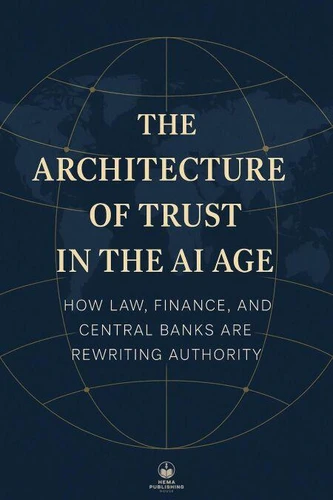Nouveauté
The Architecture of Trust in the AI Age - How Law, Finance, and Central Banks Are Rewriting Authority
Par :Formats :
Disponible dans votre compte client Decitre ou Furet du Nord dès validation de votre commande. Le format ePub est :
- Compatible avec une lecture sur My Vivlio (smartphone, tablette, ordinateur)
- Compatible avec une lecture sur liseuses Vivlio
- Pour les liseuses autres que Vivlio, vous devez utiliser le logiciel Adobe Digital Edition. Non compatible avec la lecture sur les liseuses Kindle, Remarkable et Sony
 , qui est-ce ?
, qui est-ce ?Notre partenaire de plateforme de lecture numérique où vous retrouverez l'ensemble de vos ebooks gratuitement
Pour en savoir plus sur nos ebooks, consultez notre aide en ligne ici
- FormatePub
- ISBN8231098385
- EAN9798231098385
- Date de parution09/11/2025
- Protection num.pas de protection
- Infos supplémentairesepub
- ÉditeurWalzone Press
Résumé
Trust has always been the foundation of civilization. Markets flourish when trust is strong, currencies hold value when citizens believe, and societies remain stable when institutions earn legitimacy. But today, trust is being rewritten at a structural level. Algorithms now influence financial flows, digital identity systems determine access, central banks pilot programmable currencies, blockchains establish truth without institutions, and AI systems increasingly participate in decision-making that affects human lives.
This book explores a profound global shift: the transition from institution-based trust to a hybrid architecture where humans, legal systems, economic networks, and intelligent machines share authority. It examines how central banks are adapting to programmable economies, how cryptographic systems and digital identity frameworks reshape sovereignty, how algorithmic supervision changes regulation, and how misinformation and synthetic media challenge shared truth.
It also addresses the deeper ethical questions that arise when power becomes computational and accountability risks becoming diffused across systems instead of individuals. Written in an analytical and forward-looking style, this work connects financial history, legal theory, geopolitical strategy, and emerging technology. It presents a structured framework for how trust must be engineered in the AI age, offering guidance for policymakers, business leaders, central bankers, technologists, legal thinkers, and strategists who must navigate a world where authority is contested, legitimacy is earned through transparency and accountability, and public faith depends on systems that can be explained, audited, and governed responsibly.
The future will not belong to centralization or decentralization alone. It will belong to societies that strike a deliberate balance: human ethics supported by algorithms, sovereign authority complemented by cryptographic assurance, and institutions that evolve without abandoning their moral responsibility. In a century defined by intelligence as infrastructure, trust must be designed consciously and defended continuously.
This book serves as an intellectual blueprint for that journey.
This book explores a profound global shift: the transition from institution-based trust to a hybrid architecture where humans, legal systems, economic networks, and intelligent machines share authority. It examines how central banks are adapting to programmable economies, how cryptographic systems and digital identity frameworks reshape sovereignty, how algorithmic supervision changes regulation, and how misinformation and synthetic media challenge shared truth.
It also addresses the deeper ethical questions that arise when power becomes computational and accountability risks becoming diffused across systems instead of individuals. Written in an analytical and forward-looking style, this work connects financial history, legal theory, geopolitical strategy, and emerging technology. It presents a structured framework for how trust must be engineered in the AI age, offering guidance for policymakers, business leaders, central bankers, technologists, legal thinkers, and strategists who must navigate a world where authority is contested, legitimacy is earned through transparency and accountability, and public faith depends on systems that can be explained, audited, and governed responsibly.
The future will not belong to centralization or decentralization alone. It will belong to societies that strike a deliberate balance: human ethics supported by algorithms, sovereign authority complemented by cryptographic assurance, and institutions that evolve without abandoning their moral responsibility. In a century defined by intelligence as infrastructure, trust must be designed consciously and defended continuously.
This book serves as an intellectual blueprint for that journey.
Trust has always been the foundation of civilization. Markets flourish when trust is strong, currencies hold value when citizens believe, and societies remain stable when institutions earn legitimacy. But today, trust is being rewritten at a structural level. Algorithms now influence financial flows, digital identity systems determine access, central banks pilot programmable currencies, blockchains establish truth without institutions, and AI systems increasingly participate in decision-making that affects human lives.
This book explores a profound global shift: the transition from institution-based trust to a hybrid architecture where humans, legal systems, economic networks, and intelligent machines share authority. It examines how central banks are adapting to programmable economies, how cryptographic systems and digital identity frameworks reshape sovereignty, how algorithmic supervision changes regulation, and how misinformation and synthetic media challenge shared truth.
It also addresses the deeper ethical questions that arise when power becomes computational and accountability risks becoming diffused across systems instead of individuals. Written in an analytical and forward-looking style, this work connects financial history, legal theory, geopolitical strategy, and emerging technology. It presents a structured framework for how trust must be engineered in the AI age, offering guidance for policymakers, business leaders, central bankers, technologists, legal thinkers, and strategists who must navigate a world where authority is contested, legitimacy is earned through transparency and accountability, and public faith depends on systems that can be explained, audited, and governed responsibly.
The future will not belong to centralization or decentralization alone. It will belong to societies that strike a deliberate balance: human ethics supported by algorithms, sovereign authority complemented by cryptographic assurance, and institutions that evolve without abandoning their moral responsibility. In a century defined by intelligence as infrastructure, trust must be designed consciously and defended continuously.
This book serves as an intellectual blueprint for that journey.
This book explores a profound global shift: the transition from institution-based trust to a hybrid architecture where humans, legal systems, economic networks, and intelligent machines share authority. It examines how central banks are adapting to programmable economies, how cryptographic systems and digital identity frameworks reshape sovereignty, how algorithmic supervision changes regulation, and how misinformation and synthetic media challenge shared truth.
It also addresses the deeper ethical questions that arise when power becomes computational and accountability risks becoming diffused across systems instead of individuals. Written in an analytical and forward-looking style, this work connects financial history, legal theory, geopolitical strategy, and emerging technology. It presents a structured framework for how trust must be engineered in the AI age, offering guidance for policymakers, business leaders, central bankers, technologists, legal thinkers, and strategists who must navigate a world where authority is contested, legitimacy is earned through transparency and accountability, and public faith depends on systems that can be explained, audited, and governed responsibly.
The future will not belong to centralization or decentralization alone. It will belong to societies that strike a deliberate balance: human ethics supported by algorithms, sovereign authority complemented by cryptographic assurance, and institutions that evolve without abandoning their moral responsibility. In a century defined by intelligence as infrastructure, trust must be designed consciously and defended continuously.
This book serves as an intellectual blueprint for that journey.






